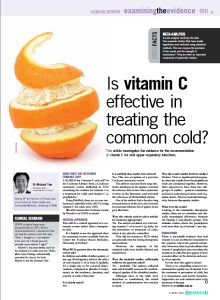 This article was published in Medical Observer.
This article was published in Medical Observer.
The article is also available on the Medical Observer website (may need registration).

Apr 13 2012
 This article was published in Medical Observer.
This article was published in Medical Observer.
The article is also available on the Medical Observer website (may need registration).
Mar 30 2012
This new revised lecture was first given to medical students in the Phase 2: Society and Health term at the University of New South Wales on Friday, 30 March 2012.
Audio recording of the lecture:
[youtube http://www.youtube.com/watch?v=02yXUlDFdSw]Mar 23 2012
Comment to the article, “Evidence-based medicine v alternative therapies: moving beyond virulence” by Kerreen Reiger, published in The Conversation:
Health claims are empiric claims. They can be tested using empiric methods. Scientific frameworks allow use to gauge the reliability of evidence. For example, the narrative claim from an individual that they were helped by chiropractic is much less useful for predicting whether chiropractic will help another individual in the future compared with evidence from a clinical trial.
This is not profound.
That medical consultations need to take into account patient values and clinical expertise is unquestioned. It is remarkable that proponents of CAM believe that non-CAM practitioners believe otherwise. All arguments that claim that the supporters of evidence-based medicine (EBM) do not hold both as important in clinical decision making should be denounced for what they are: nonsense.
The genesis of EBM is the recognition that respecting patient values, and having clinical expertise is NOT ENOUGH. The additional “special sauce” of EBM is that clinical decisions need also be informed by the best available scientific evidence. We should be mindful of the powerful cognitive biases that operate in clinical interactions, both in patients and clinicians. We should recognise that individual beliefs about health, illness and disease is not the same as empiric reality.
Mar 21 2012
The following is a comment to an opinion piece, “Tarring complementary medicine is anti-choice” written by Kerryn Phelps in Medical Observer. My comments were published online on 21 March 2012.
I concur with some of the statements in the comments and feel I must support my colleagues who are members of the Friends of Science in Medicine (FSM).
Mar 15 2012
Comment to the article “Homeopathy isn’t unethical, it’s just controversial” by Jon Wardle, published in The Conversation.
To be frank, it is really quite simple. Homoeopathy isn’t “controversial”. It does not work. There is no good empiric evidence that it does, plenty of empiric evidence that it doesn’t, and entirely lacks scientific plausibility.
There is a misunderstanding of evidence-based medicine that supportive evidence of an intervention study in an RCT is equivalent to evidence of effectiveness. This is not true. If you do 20 perfectly run RCTs on inert substances using the standard for statistic significance at P < 0.05, you would expect that 1 study would demonstrate a statistically significant result. The point is, RCTs are only really valid when taken in the context of the pre-text probability of the intervention. As has been mentioned many times before, for homoeopathy (the specific intervention) to be true, we must overturn our knowledge of physics and chemistry. Continue reading
Apr 23 2012
Comment: Testicular self-examination
These were comments to the article “Monday’s medical myth: testicular self-examination is a waste of time” by Mark Frydenberg, published in The Conversation.
Thank you for your opinion, Prof Frydenberg, but can this really be considered a “myth”? I appreciate that your affiliated organisation Andrology Australia recommends routine testicular self-examination, but this is not the position of the Royal Australian College of General Practitioners, nor the US Preventive Services Task Force.
If I’ve read your article correctly, your rationale is that routine self-examination will lead to earlier detection and better survival, and that it has no harm. These claims need to be examined carefully. As has been pointed out already, there is no evidence that routine screening improves survival, and indeed, it is unlikely that any screening procedure will. This is not only because testicular cancer is relatively uncommon but because treatments are so effective at all testicular cancer stages. Continue reading